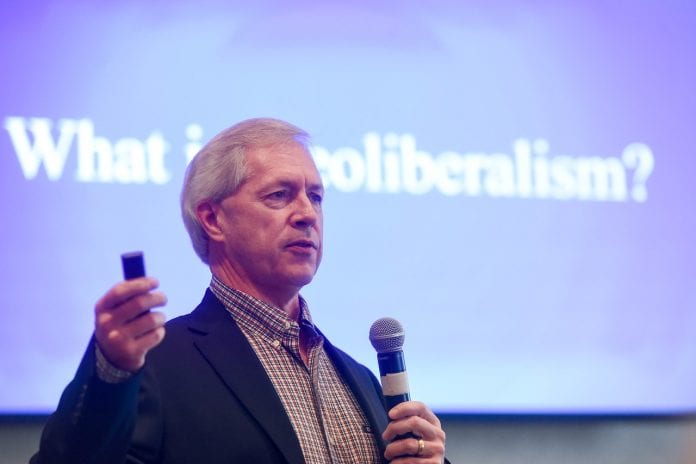Approximately 50 students, faculty, professional counselors, social workers and clergy participated recently in a conference hosted by Belmont’s graduate Mental Health Counseling program on the topic “The Erosion of Psychological, Social, and Interpersonal Health in the Age of Contemporary Capitalism.”
The conversation was led by Dr. Bruce Rogers-Vaughn, an associate professor of the practice of pastoral theology and counseling at Vanderbilt Divinity School who brings 30 years of experience in clinical pastoral psychotherapy to his teaching and research. Dr. Rogers-Vaughn is also president/co-founder of the Pastoral Center for Healing in Nashville, where he continues his clinical practice.
Rogers-Vaughn pointed to a number of changes in American society that occurred in the 1980s, particularly the rise of neoliberalism and its impact on culture the past 40 years. He noted how in 1983, 90 percent of media was owned by 50 companies while in 2018, 90 percent is held by a mere five companies, a figure that may decline even more as Disney’s purchase of 21st Century Fox is anticipated to be complete next year. In addition, Americans are experience more credit card debt percentage-wise that ever before in recorded history. Plus, significant gaps between the “haves and have nots” exist and are expanding.
“Since 2015, the richest one percent has owned more wealth than the rest of the planet,” he said. “In fact, eight men–and they are all men–now own the same amount of wealth as the poorest half of the world. Why should psychotherapists care? Because economic inequality is an intense marker of social well being.”
Dr. Rogers-Vaughn went on to discuss how the current phase of capitalism is negatively impacting clients’ social, interpersonal, and psychological health through a form of human distress, one he calls the “third order suffering.” In small groups attendees were able to examine how they see secularization and postmodernity impacting clients. The all day session also suggested solutions, providing details on how counselors can offer help and care to those needing assistance.
Dr. Janet Hicks, professor and director of Belmont’s mental health counseling program, said, “This conference gave counselors a new perspective on systemic societal problems and explained so many of the mental health issues our clients are facing. Since income inequity is at an all time high, counselors also learned some new avenues where advocacy is needed. It was one of the most thought provoking conferences I have ever attended.”
Rogers-Vaughn is associate professor of the practice of pastoral theology and counseling at Vanderbilt Divinity School. He brings 30 years of experience in clinical pastoral psychotherapy to his teaching and research and is president/co-founder of the Pastoral Center for Healing in Nashville, where he continues his clinical practice.



